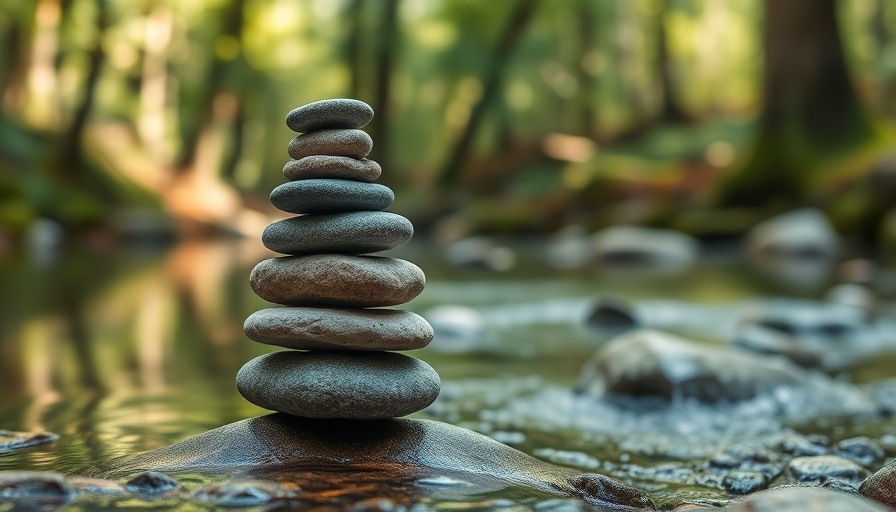
Unlocking Ancient Wisdom for Modern Dilemmas
In an age dominated by fast-paced living and digital distractions, many individuals find themselves grappling with feelings of stress and discontent. For men aged 35-55, particularly those who are professionals or fitness enthusiasts, the struggle to find balance can often lead to a search for deeper meaning. One ancient philosophy that resonates well with our contemporary struggles is Buddhism. Known for its profound insights into the human experience, Buddhism offers principles that can aid in navigating the complexities of modern life.
Understanding the Foundations of Buddhism
Buddhism is more than a religion; it is a philosophical approach that emphasizes mindfulness and the nature of suffering. At the core of Buddhist teachings are the Four Noble Truths, which outline the nature of suffering and the path to overcoming it. This ancient wisdom can provide a strong foundation for personal growth and self-improvement. Brendan Barca, co-author of The Daily Buddhist: 366 Days of Mindful Living, provides an accessible introduction to these principles and how they can be integrated into daily routines.
The Eightfold Path: A Practical Guide for Men
The Eightfold Path is essential in Buddhism, acting as a guide to ethical and mental development. It encompasses Right Understanding, Right Intent, Right Speech, Right Action, Right Livelihood, Right Effort, Right Mindfulness, and Right Concentration. By embodying these principles, men can cultivate greater self-awareness, improve relationships, and enhance their overall well-being.
Buddhism vs. Stoicism: Lessons for Modern Professionals
While Buddhism offers one path, it also draws interesting parallels with another ancient philosophy: Stoicism. Both philosophies encourage resilience in the face of adversity and advocate for understanding the impermanence of life. By exploring these connections, men can glean valuable insights on how to manage stress and embrace life's challenges with a composed mind.
Practical Meditation Techniques for Everyday Life
Meditation is a key component of Buddhist practice, and there are various methods to suit different personalities and lifestyles. From Shamatha Meditation, which focuses on calming the mind, to Vipassana, which promotes insight into the nature of reality, each technique offers unique benefits. Beginners can start with simple breathing exercises, gradually advancing to more structured practices as they grow comfortable with meditation.
Creating Compassion and Patience in Daily Interactions
Incorporating Buddhist principles into daily life can significantly improve emotional resilience. For men dealing with the pressures of work, competition, and personal expectations, cultivating compassion and patience can transform not only how they view their struggles but how they interact with others. This shift can lead to strengthened relationships, improved teamwork, and a more satisfying life overall.
Striving with Vigilance: The Buddha's Final Words
In his final words, the Buddha emphasized the importance of vigilance in striving towards wisdom and enlightenment. This mantra is especially relevant today, urging men to remain proactive in their pursuit of personal growth and mental health. The journey of self-improvement is continuous, and staying vigilant helps in overcoming life’s inherent challenges.
Engaging with the Community: Becoming Part of the Mindful Movement
Incorporating the teachings of Buddhism into modern life doesn’t have to be a solitary journey. Engaging with a community of like-minded individuals can provide support and motivation. Whether through local meditation groups or online platforms, connecting with others can enhance personal growth and understanding. Sharing experiences and learning together can make the practice of mindfulness more enriching and effective.
Conclusion: Taking Steps Toward a Meaningful Life
The exploration of ancient Buddhist principles offers profound insights into managing modern life’s dilemmas. For men seeking personal growth, these teachings can serve as a transformative guide. As you reflect on these principles, consider how you can apply them to enhance your own journey toward fulfillment and connection. Seek out opportunities to learn more about mindfulness, meditation, and Buddhism, and strive to incorporate these valuable lessons into your daily life.
For more ways to enhance your well-being and engage with mindfulness practices, pay a visit to the resources available online or in your community.
 Add Row
Add Row  Add
Add 




Write A Comment